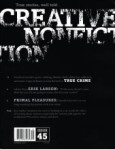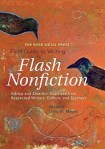When Amye Archer took care of The Write Life posts back in the day, she invited fellow Wilkie Gale Martin to contribute something for this blog. Gale’s piece has as much relevance today as ever, so what better way to get tips on writing than from someone with personal experience and staying power….
Originally posted May 12, 2011
Preparing for writing success demands common sense and self care
by Gale Martin
You’ve just completed your novel, your memoir, or your chapbook. You’ve gotten strong feedback from your beta-reader(s) or an outside evaluator through the Wilkes University Creative Writing program where you’ve received unprecedented access to the almighty gatekeepers—agents and editors. Maybe you attended a conference and pitched your book to an agent who requested a complete manuscript. Nothing can stop you now. Surely, you’ll have a publishing contract in hand within months, right?
Maybe. Maybe not. According to Putting Your Passion into Print, more than 150,000 books are conventionally published every year. That’s an incredibly large number of publishing opportunities compared to the number of screenplays actually made into feature length films every year. There’s plenty of room for good books—yours included.
Statistics such as ‘less than five percent of popular booksellers total sales are bestsellers’ provide reason enough to be optimistic that you may one day join the ranks of published authors. That is, if you don’t expect too much success too soon. That’s the fastest route to burnout. Expecting to be the next overnight writing sensation might be the single greatest handicap to the writing career you so desperately seek. Prepare instead for a long slog. Commit yourself and your faculties to writerly habits and a lifestyle that can sustain you and your writing career.
Keep writing. After I wrote my first novel in 2005, I was so proud of the fact that I’d completed a work of fiction, I used to carry it around with me wherever I went. After a few months, a pair of tired arms, and only one nibble from an agent, I realized that completing a novel was only the beginning of my writerly journey. I began writing flash fiction, short stories, and humorous essays while I began plotting my next novel. One of the writers I follow on Twitter who is also a literary agent never sold his first book—the one he was certain would sell. But sold plenty after that. So, keep writing. It’s never good to pin your hopes to one manuscript.
Not to mention that editors and agents want writers who are good for more than one book. One of the Wilkes’ faculty members Lenore Hart sold her latest book The Raven’s Bride before it was written. Her publisher was banking on Lenore’s reputation for producing another publishable novel.
Keep submitting other work elsewhere. As long as you continue writing, you’ll not only be honing your craft, have work to submit to publications and contests. For most of us, rejections far outweigh acceptances. You have to submit a critical level of work before the odds start turning in your favor. Once they do, every acceptance is validation to stay the course and builds confidence which you’ll need for more rejections and the inevitable slog.
Set reasonable goals. In recent craft classes at Wilkes, writer Lori A. May shared a framework for goal setting for a rich, focused writing career. Her model encourages writers to think in bigger chunks beyond the next story, the next month, the next acceptance. Set goals that will stretch you. But don’t doom yourself to failure either by comparing yourself to someone who’s achieved instant publishing success or setting irrational goals, such as, “Will have literary representation in one month.” Perhaps you won’t. I just interviewed a writer on my blog Scrivengale who has published four books but doesn’t have an agent. Make your goal instead, “Will query five agents every month.”
Volunteer to judge a contest. Reading others writers’ work with whom you’re not competing head to head, within your cohort or in the Wilkes program in general, can be eye-opening. It’s a productive way to learn from others’ mistakes and successes while being a good literary citizen.
Look for outlets to read your work. If none exist, create one. One of thegreat privileges published authors enjoy is the chance to read their work in public venues. In the Wilkes program, students are given several opportunities to do that. Once you’re out of the program, it’s one of the things you miss most.

At least I did because I love reading my work. Not seeing anything available in her hometown, one of the students in my cohort Ally Bishop went out and created an outlet for writers in Central Pennsylvania to read their work—published and unpublished—readings in which I’ve taken part. I know other Wilkes students are following Ally’s example, approaching galleries, book shops, and coffee shops about offering literary readings.
Get a writing group together. Writing is an insular life. If you don’t have an editor to give you pause to think about your narrative arc, to redirect your work, you would probably benefit from participating in a writing group. I said a writing group, not a shredding group. I’ve been in a shredding group—an utter waste of time and potentially devastating. If you can find a handful of other writers committed to careful reading and constructive criticism, it helps fill the gap left between working with a faculty mentor or a professional editor and writing in solitude.
Explore other avenues of sharing your work, like Scribd. I just learned about www.scribd.com, a social publishing site, where tens of millions of people share original writings and documents. One young woman who wrote a memoir but couldn’t obtain any interest from a conventional publisher, shared her memoir in segments on Scribd, obtaining three thousand readers per post. Few bloggers can attract that volume of readership. It may be worth your time investigating.
Write something for sheer enjoyment. I’m not sure where I heard about this online writing community at The Write Idea, an international group of poets and prose writers, but for three years now I have participated in a nine-round fiction contest with some of the most generous, talented writers I’ve ever met. It is sheer fun to receive the prompts, chat them up on the site, and see how everyone fares following each round of judging. This contest is something I do just for the love of writing and as such, the sustenance it offers me is invaluable.
Create something for sheer enjoyment. I read Jane Friedman’s blog There Are No Rules regularly, which is how I learned about Scribd. In one of her columns, Jane also mentioned a site called About.me, which allows writers and other creatives the chance to create a free splash page, in lieu of a full-blown website. It was a great exercise trying to encapsulate my writing experience and persona into a splash page and lots of fun doing so.
Strive for a more balanced life. Shortly after I finished the Wilkes program, I needed a month to thaw out, having combined my studies with demanding full-time jobs. Then I looked around my very untidy house, threw myself into some cleaning projects, and planned an anniversary celebration. I also recommitted myself to regular church attendance and singing in the choir, which meant rehearsing one night a week away from my *sigh* laptop, which I was certain was attached to my fingers. I don’t know if I’ll ever have the level of life balance I enjoyed before I began writing creatively, but the writing schedule a master’s or MFA program demands wasn’t going to sustain my marriage or a life well-lived. I simply had to make some changes.
To outsiders, it may appear that I’ve ratcheted down my expectations for my publishing career, but that’s not an accurate assessment of my approach to my post-Wilkes writing. I’m merely steeling myself for a long slog but fully intending to appreciate any smaller success along the way.
 Gale Martin
Gale Martin
Gale Martin is a Wilkes alum. Since graduating, she has had several publications including the novels Grace, Unexpected and Don Juan in Hankey, PA.
 It may be a challenge to find a wide assortment of literary journals at your local bookseller these days—if you still have a local bookseller in your town. Thankfully, the fine folks at NewPages.com have developed an up-to-the-minute web store where readers can pick up single copies of journals—no subscription required!
It may be a challenge to find a wide assortment of literary journals at your local bookseller these days—if you still have a local bookseller in your town. Thankfully, the fine folks at NewPages.com have developed an up-to-the-minute web store where readers can pick up single copies of journals—no subscription required!




